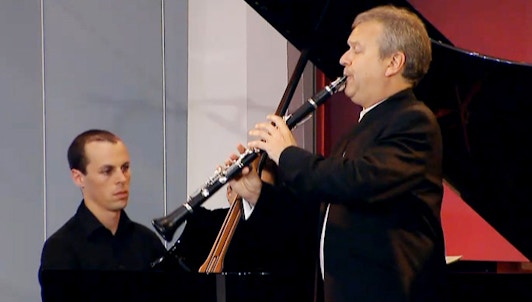Close friends and colleagues for almost forty years, Isaac Stern and Alexander Schneider first met in 1935, when Stern came to hear the Budapest Quartet perform all the Beethoven and Bartok quartets at Mills College in California. Stern was then fifteen and was amazed at the perfection of their playing and the intensity of their commitment.
Whenever interviewers asked Schneider to name his favourite living violinist, he would hasten to acknowledge the outstanding merits of all other violinists before replying "Isaac Stern." And he would then add: "No one else has such a capacity for emotion, with warmly expressive phrasing that comes straight from the depths of his soul and strikes the listener directly by dint of its beauty." Conversely, Schneider never hesitated to reproach Stern with typical frankness and brusqueness for something that many others would not have dared to say openly: a failure to be sufficiently concentrated on the music and on his violin.
Stern threw himself into countless activities, notably in the political sphere, giving his time and energy without counting the cost and seeking to take advantage of life in all his forms. He would sometimes arrive badly prepared for a concert, not least because he always had thirty or so concertos in his repertoire. He also had serious heart problems in 1968, leading to a gradual loss of technique. Even his recordings of the Mozart concertos included in the present release contain imperfections. He himself used to say: "Don't make yourself ill over the notes you've missed, it's those you got right that matters."
Mozart's Violin Concerto No. 3 was the one that Stern played most often. It was also the first that he recorded, in March 1950, with a small chamber orchetra assembled specially for the occasion. However much pleasure it gave him, he generally refused to take on the double role of soloist and conductor, as he believed that there was nothing more stimulating for a soloist that for a conductor capable of sudden inspiration to bring his own ideas to the piece.
He went on to record Mozart's concertos with George Szell and Alexander Schneider. Widely regarded as one of the greatest Mozartians of his century, Stern interpreted the works in a way that made them seem the very image of their exponent. They speak to us directly, in an infinitely persuasive tone. They do not strive to be original but give us a feeling of truth, of something entirely self-evident. And although they eschew sentimentality, their slow movements often move us to tears. As music critic Clarendon said, Stern was completely at home in Mozart.
All of Stern's concerts contained moments of magic that remain lodged in the memory and that allow us to overlook the less successful ones. Even during his youth, Stern was never interested in pure virtuosity nor in the narcissism of a beautiful tone. Here we can admire the economy of his vibrato, which is never used to seduce us with artificial brilliance but which is placed in the service of expression. This was one of the great lessons that he learnt from the great Pablo Casals: to be capable of adapting the speed and breadth of his vibrato to the demands of the music. These 1975 concerts allow us to appreciate the fabulous violinist that Stern could be, his authority and the richness of his playing both proving altogether overwhelming.


